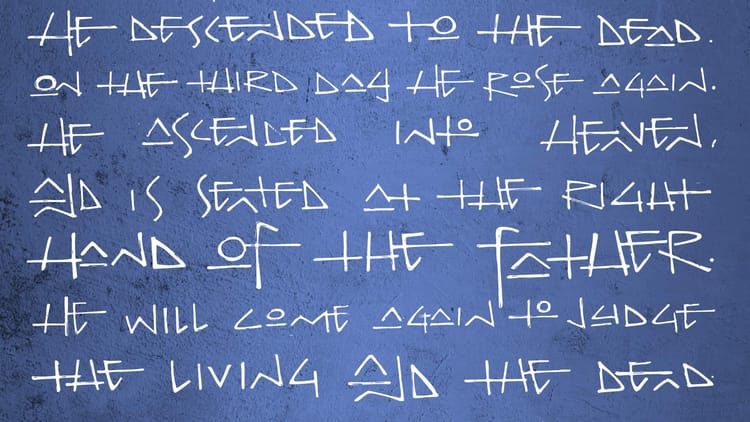Christ is Enough (Philippians 3:1-16)

Every year this time, we begin thinking about the coming year. And every year, despite resolving that we won’t do it anymore, we make New Year’s Resolutions. The popular website 43Things.com has been tracking resolutions and how they change from year to year. Here are the most common:
- The #1 resolution every year except for 2009 is to lose weight
- The other top resolutions from last year were to be happy, fall in love, get a job, and travel. But if you get a job it may be hard to travel. I haven’t figured that out yet.
- Other top resolutions include quitting smoking, saving money, getting organized, going to bed earlier.
- One resolution that showed up in 2007 but has disappeared since then is “Get a tattoo.” I think everyone who planned to get a tattoo this year probably did, and one tattoo is usually enough for most people.
I don’t want to do the predictable New Year’s sermon on resolutions, but I feel compelled this morning to encourage you to make a New Year’s resolution that you won’t find on 43Things.com. In fact, I’m going to encourage you to make this your only New Year’s Resolution. You can lose weight and fall in love if you’d like, but this one resolution is actually going to be enough.
And here it is: Let us resolve in the coming year to know Christ. That’s it.
The reason is that Christ is enough. In one year if we look back and evaluate 2011, I believe that all of us would say that it was a worthwhile year no matter what else happened if we can say that we know Christ better, if we can say what the apostle Paul said in the passage we just read:
I want to know Christ–yes, to know the power of his resurrection and participation in his sufferings, becoming like him in his death, and so, somehow, attaining to the resurrection from the dead.
And so this morning, because it’s the day after Christmas, I want to make this as simple and clear as possible. This morning I want to tell you what we don’t need to resolve in the coming year. And then I want to tell you the one thing that we can and should resolve for 2011.
What Not to Resolve
So here’s what not to resolve. Paul in chapter 3 is addressing the Philippian church, particularly one group that focuses on keeping God’s law, revealed by Moses, as the basis of a relationship with him. I love reading this passage this time of year, because it speaks to an issue that all of us face in our hearts, especially this time of year. The issue is our tendency toward human religious effort to make ourselves right with God. This is something I struggle with all the time, and you probably do as well.
Here’s how it works. We think in terms like this with God: “God, you accept me because…” I want you to think about that for a minute and fill in the blank. It could be any number of things. God accepts us, we think, because:
- We go to church.
- We live a moral life.
- We made a commitment to Christ.
- The good things we do outweigh the bad things.
- We’re church members.
- We read the Bible and pray regularly.
I want you to think about this for a minute. What is it that you look to in your life that you believe makes you right with God? If you were to complete the sentence, “God, you accept me because…” what would you say?
In the passage we have before us, Paul goes at this tendency that all of us have to try to do something as a way of earning God’s approval. Paul speaks of those who believed that God accepted them because they kept the Jewish rite of circumcision when he says in verses 3-4: “For it is we who are the circumcision, we who serve God by his Spirit, who boast in Christ Jesus, and who put no confidence in the flesh–though I myself have reasons for such confidence.”
What does he mean by the flesh? The reformer John Calvin said that the flesh is “everything that is outside of Christ.” “He thus reproves, and in no slight manner, the perverse zealots the law, because, not satisfied with Christ, they have recourse to grounds of glorying apart from him.”
What Paul is saying is that we can’t put confidence in anything other than Jesus Christ for our right standing with God. We cannot get right with God through our own religious works. There is no room for rule-based religious rituals. They look impressive, but they do nothing to bring you into a true relationship with God.
Paul should know, because Paul lists his own religious credentials in verses 4-6. He had everything going for him: the right pedigree, and impeccable moral and religious performance. But then he says in verses 7-9:
But whatever were gains to me I now consider loss for the sake of Christ. What is more, I consider everything a loss because of the surpassing worth of knowing Christ Jesus my Lord, for whose sake I have lost all things. I consider them garbage, that I may gain Christ and be found in him, not having a righteousness of my own that comes from the law…
This is one of those times that the translators have softened what Paul actually says. Paul considers everything that he could claim as a means of measuring up as rubbish, as liabilities. He actually gets a bit graphic here by using the rather crude illustration of dung. He says that all the flesh can produce is, in essence, human waste. None of it matters. We can’t measure up on our own.
I love how George Whitefield put it:
I do not know what you may think, but I can say that I can not pray but I sin–I can not preach to you or to any others but I sin — I can do nothing without sin; as one expresseth it, my repentance wants to be repented of, and my tears to be washed in the precious blood of my dear Redeemer.
Our best duties are as so many splendid sins. Before you can speak peace to your heart you must not only be sick of your original and actual sin, but you must be made sick of your righteousness, of all your duties and performances. There must be a deep conviction before you can be brought out of your self-righteousness; it is the last idol taken out of our heart. The pride of our heart will not let us submit to the righteousness of Jesus Christ. But if you never felt that you had no righteousness of your own, if you never felt the deficiency of your own righteousness, you can not come to Jesus Christ.
That’s why this morning I’m asking you to make no other resolutions other than to know Christ. You can lose weight if you want, or stop biting your nails. But we need to realize that all of our efforts to measure up apart from Christ are futile and dangerous. God doesn’t accept us on the basis of anything other than Christ. So stop trying to measure up! Don’t even get comfortable with others who are trying to earn God’s acceptance through any human effort or accomplishment. Refuse to resolve to do anything that will take your focus away from Christ in the coming year.
So what’s the alternative?
Resolve to Know Christ
Read with me again verses 8-14:
What is more, I consider everything a loss because of the surpassing worth of knowing Christ Jesus my Lord, for whose sake I have lost all things. I consider them garbage, that I may gain Christ and be found in him, not having a righteousness of my own that comes from the law, but that which is through faith in Christ–the righteousness that comes from God on the basis of faith. I want to know Christ–yes, to know the power of his resurrection and participation in his sufferings, becoming like him in his death, and so, somehow, attaining to the resurrection from the dead.
Not that I have already obtained all this, or have already arrived at my goal, but I press on to take hold of that for which Christ Jesus took hold of me. Brothers and sisters, I do not consider myself yet to have taken hold of it. But one thing I do: Forgetting what is behind and straining toward what is ahead, I press on toward the goal to win the prize for which God has called me heavenward in Christ Jesus.
Paul says he wants one thing: to know Christ. Because, he says, if you know Christ, it’s enough.
Our human efforts will never be enough. Instead, we can simply resolve to know Christ. In Scripture, knowing means more than an intellectual assent; it means grasping and acknowledging what Christ has done through Christ, and submitting to the Lordship of Christ. That’s what he means: knowing Christ, and knowing what he did for us at the cross. It’s all about personal acquaintance, about having insight into the central act of all history: what Jesus Christ did for us at the cross.
And then Paul lists two results in this passage. First, in verse 8, he says he wants to “gain Christ” who is of surpassing worth. Jesus really is worth more than anything or anyone else. Jesus is not the path to the prize; he is the prize itself. He is worth more than any of our moral accomplishments. He is the treasure of surpassing value. He is worth more than anything.
There’s a second result. In verses 10-11 he says that as we gain Christ, our lives will increasingly take the shape of Christ’s death and resurrection. This means that we will suffer like Christ, but our sufferings will be worth it. And we will not only experience suffering that’s worth it, but we’ll also experience resurrection life. How do we change? By knowing Christ. As we know Christ more and more, it will shape the rest of our lives.
For this, we can count everything else but loss. We can resolve to know Christ, because Christ is enough. If we have him, we have everything that we need. So, Paul says, resolve to know Christ better, because Christ is enough.
So resolve to know Christ better in the coming year. Accept no substitutes. Don’t settle for the sugar that gives you a buzz but doesn’t fill the deep hunger of your soul. Pursue the feast that your soul truly craves.
I want to close with a quote from the book Good News for Anxious Christians:
What the gospel of Christ does is give us Christ, and that is enough. We can let everything else be what it is – hard work, worthwhile work, works of love, and the heartaches that come with all of that. And we can let our feelings be what they are, whatever that may be. What matters is Jesus Christ, and all is well on that score: that we are our Beloved’s and he is ours…The gospel gives us Christ the way a wedding vow gives you a bridegroom. From now on you know who he is, that he is yours, that he has promised to love you, and because he keeps his promise, everything else will be alright….
It is our job to give our lives for others, and that is nothing but death unless Christ has given his life to us first. We need this good news, this daily bread, this cheerful word about our Beloved who is ours. God means it for our good, for he means us to have Christ, his own beloved Son. And that is enough to live on for eternity.
So Father, may we know Christ. May he be our treasure, the one who means more to us than anything else. May he be our consuming passion in the coming year. In Jesus’ name, Amen.






